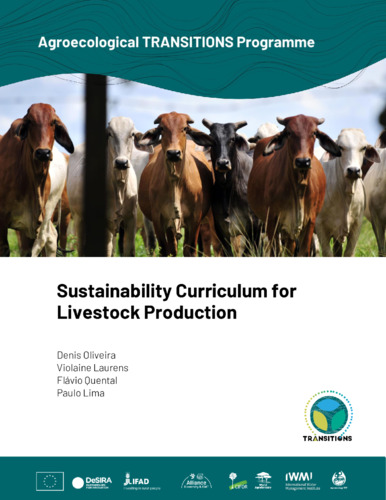Sustainability curriculum for livestock production
Abstract
This curriculum is the result of a participatory process carried out by people and organizations committed to promoting sustainability in the Brazilian livestock value chain. Prepared in the context of the Inclusive Digital Tools Project (ATDT) , this document involved the direct participation of farming families living in the region between the municipalities of Novo Repartimento and Anapu, in the southwestern region of the state of Pará, and consolidates lessons learned from a journey of co-creation to adapt sustainable practices for livestock production in the region and the development of digital tools to disseminate knowledge and practical experiences.
The Inclusive Digital Tools Project (ATDT) aims to make digital technologies accessible to all, to integrate resilience and climate change mitigation with agroecological objectives and train farmers to develop new practices. It is an initiative of the Agroecological Transitions Program for Building Resilient and Inclusive Agricultural & Food Systems (TRANSITIONS), funded by the European Union through its DeSIRA initiative and managed by the International Fund for Agricultural Development (IFAD) . The TRANSITIONS program seeks to support large-scale agroecological transitions through the development and adoption of multidimensional performance indicators for food and agricultural systems, inclusive digital tools, incentives and public and private sector investments for food systems.
The main objective of the Sustainability Curriculum for Livestock production is to share the results obtained and the knowledge generated through a process of co-creation, in which producers actively contributed to adapting sustainable production practices to their local context. The purpose of this document is also to present a digital tool developed in an equally collaborative way with farmers and extension agents to facilitate and expand the dissemination of and access to knowledge about production practices for sustainable livestock farming in the Brazilian Amazon.
By incorporating concepts of agroecology, co-creation and digital inclusion, this curriculum proposes a participatory methodology that aims to adapt and reproduce the process in other territories, whether with similar or different contexts. Its proposal is to provide a flexible methodological framework, capable of adjusting to the different characteristics of Brazil's diverse rural environments. With a similar approach, the digital tool presented here, Solis, aims to engage small and medium-scale rural producers, facilitating access to information and knowledge that can improve their production systems. In an innovative way, this tool allows farmers and extension technicians to continuously participate in a process of knowledge co-generation, giving them the opportunity to share their own experiences and knowledge.
Solis also has the ambition and potential to create a broad network made up of producers and extension technicians, researchers and academics, public policy makers and decision makers, public and private sector organizations and other actors dedicated to promoting sustainability in Brazilian agricultural production, prioritizing the development of territories.
Thus, the methodology for conducting participatory processes for the co-creation and adaptation of practices combined with the use of the digital tool developed within the framework of the Inclusive Digital Tools Project (ATDT) offers an innovative alternative for strengthening Technical Assistance and Rural Extension systems and programs in Brazil.
In addition to the methodology for co-creating and adapting production practices to the local context and the digital tool associated with this methodology, the Sustainability Curriculum for Livestock production also presents the results obtained from applying this methodology in the municipalities of Novo Repartimento, Anapu and Pacajá from November 2023 to November 2024. In this way, the curriculum fulfills its purpose of sharing experiences, results and tools with other actors and agents related to the topic.
Finally, it is important to clarify what this curriculum is not intended to be. It is by no means a universal set of practices that all producers should adopt. Nor is it intended to serve as content for certification or traceability systems. Furthermore, it is not intended to be a definitive guide to sustainability, as this would contradict its fundamental premise: collaboration between local actors to adapt its content to the specific realities of each context.
Thus, its value proposition lies precisely in sharing the premises and principles adopted, the methodology used, the digital tool developed, and the results obtained so far. The hope is that these results and lessons can be useful and inspiring enough to be adapted to other contexts and, in the same way, contribute to authentic, inclusive, efficient and resilient territorial development.

